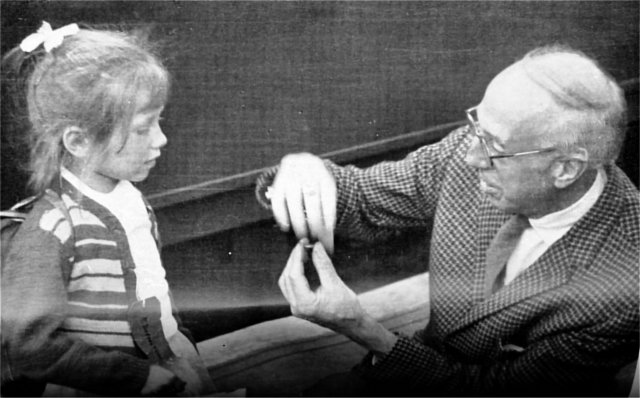
John Barclay
John Barclay died on August 22nd, 1966 having run IHC with Margaret McEwen for nearly 20 years. The article below is her tribute to him.
No doubt J.B.'s youth and manhood prepared him for the which was to become
his life. He was a delicate child as a teenager had to stay on a farm to be
built up with country air and good food. When the 1914-18 war broke out,
however, although under age, he volunteered for the army, and later
when he was nineteen was commissioned, finding himself in charge of men
many years his senior. The terrible battles Passchendaele and the March retreat
of 1918 involved him situations and conditions which altered his whole outlook.
When at last he was invalided home, with mustard gas poisoning and shattered
nerves, it was to face a future with an estimated five years to live. J.B.'s
will-power, energy and personal courage proved the doctors to be wrong and he
could never tell the story too often to describe his own battle to regain his
health, along with the difficulty of finding suitable em-
yment as well as the poverty and the discouragements of post-war world.
His engagement and marriage in 1924 to Irene Martin was a great turning point in
his life; and with this new found security he began to involve himself in the
Co-Operative movement. Some twelve years later he joined Dick Sheppard and with
him helped to establish the Peace Pledge Union. On the death of this beloved
friend J.B. went through a difficult time and this continued until 1946 when he
was able to join me in the Dutch Relief Scheme, which laid the foundations for
the International Help for Children.
J.B. died on August 22nd, 1966. It is still impossible to believe that he will
no longer be seen, hurrying to the office, seizing the post and opening it, as
he mounted the stairs two at a time-calling out the more interesting bits. Often
he sat at his desk for an hour or two before taking off his coat, he so grudged
the time to hang it up. He loved the telephone because it made demands on him
and led to new ideas or plans. Life was a real adventure to J.B. He had taught
himself to look forward with joy and every minute was precious in preparing for
the "New World" he felt sure was to come. How often he reminded his audiences
that amongst
the parties of children welcomed to Britain each year there might be a future
"President of the United States of the World".
An extract at the time of his memorial service from the International Help for Children Monthly Newsheet (which I edited) follows:-
On September 17th, a Memorial Service was held for John Barclay at St. Martin-in-the-Fields church. It was a simple and moving ceremony attended by six hundred people from all over the country. Also present were three members of the I.H.C, family, two from Greece, and one from Germany, who are now grown up and married. Dame Sybil Thorndike read the lesson inspiring all those present and Sir Victor Gollancz gave a warm appreciation of John's life. The Lord Mayor was represented by Brigadier Clapham. So many people have paid tributes to John in letters and articles, and I would like to quote from two of them; the first from the Farnham Herald:-
"Although an excellent organizer John Barclay disliked over organization and his success was due to the friendly relations and mutual trust which he created and invited wherever he went. As an officer on active service in the trenches during the first World War, he formed a deep and lasting rejection of war, and his views, as with so many things, were passionately held. Here was a man without any of the masks of convention who was able to say absolutely anything and get away with it. His was the vitality out-tripping that of the others running beside him. His preoccupation with the very next task was intense. Here was the fighter who hated war, tough in debate - gentle in compassion."
and the second by Father Borrelli (Italian Priest and Social reformer in Naples from who IHC had children) in his newspaper "Lo Scugnizzo":-
"The first time I met him was at Victoria Station in London when I took the first group of boys over. I always remember how much he endeared himself at that first meeting. He took some pennies from his pocket, swallowed them, and then to the astonishment of the boys took them one by one from their pockets. It was a common trick of his which he liked to play again and again. He wanted to give joy to others and bent over back- wards in an attempt to do so, but always in an almost offhand way, for fear that people might realise just how much he vras instrumental in bringing it. I often saw John resolve the most difficult problems with apparent ease, not to impress, but to give joy to others. He left us with the memory of his presence, of his work, and of his message of brotherhood, in such a way as to make us believe that we might see him again tomorrow."